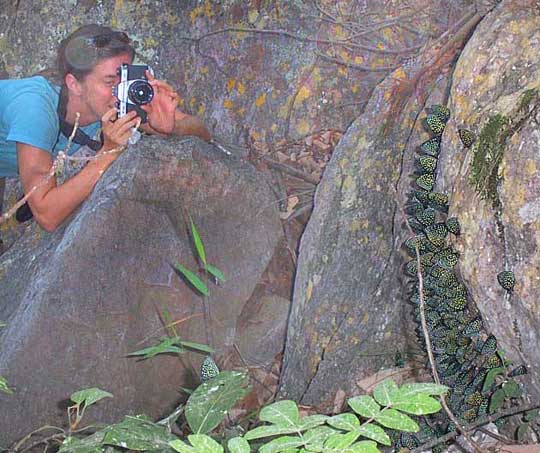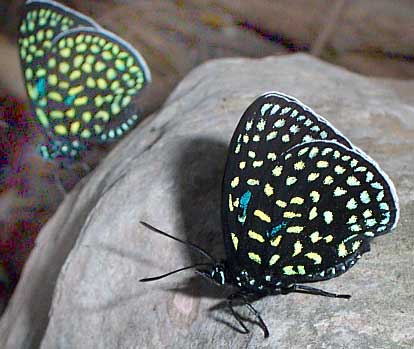Excerpts from Jim Conrad's
Naturalist Newsletter
from the April 28, 2007 Newsletter issued from Sierra Gorda Biosphere Reserve, QUERÉTARO, MÉXICO
A HUNDRED SPECKLED BUTTERFLIES ON A ROCK
One of the most spectacular encounters of the whole trip wasn't a planned one. On the road up to San Juan we stopped in a mixed juniper/oak forest to admire big cycads and look for snakes. One of the volunteers found the real stars of the stop, however, down in a shaded, protected, arroyo bed. At least a hundred butterflies with black wings heavily speckled with white spots clustered close together beneath a slightly overhanging rock. You can see a volunteer photographing the quiescent flutter below:

There's a close-up of two individual butterflies below:

Of course, when a bunch of butterflies brings as much pleasure to a group as these did us, the name is hardly relevant. Still, I'd like to know whether the species is rare, thus constituting another reason to preserve the reserve's ecosystems.
from the May 12, 2007 Newsletter issued from Sierra Gorda Biosphere Reserve, Querétaro, MÉXICO
UPDATE
Dr. Tom & Dr. Andy at the University of Florida, and Dr. Roberto at the University of Querétaro, all independently came up with the same name. The butterlies were EUMAEUS CHILDRENAE, of the Gossamer-wing Butterfly Family (Lycaenidae), and the Hairstreak Subfamily (Theclinae). Roberto referred to them as Cycad Butterflies because their caterpillars eat the big cycads we stopped to see. Roberto said that the larvae take in, or sequester, toxins from their cycad host plants, so the adults turn out to be very toxic and just don't need to worry much about predators. The elegant way to refer to this phenomenon is to call it "acquired chemical defense."
Of course this is a similar story to Monarch Butterflies, whose caterpillars eat bitter milkweed, resulting in the Monarchs tasting bitter, and also hang in big clumps. I wonder if the clumping might cause the whole resting group to emit such a dangerous-seeming odor that potential predators know to stay away?
Another English name found for this species is "Superb Cycadian." I like that.
What a pleasure to find and know this wonderful critter.